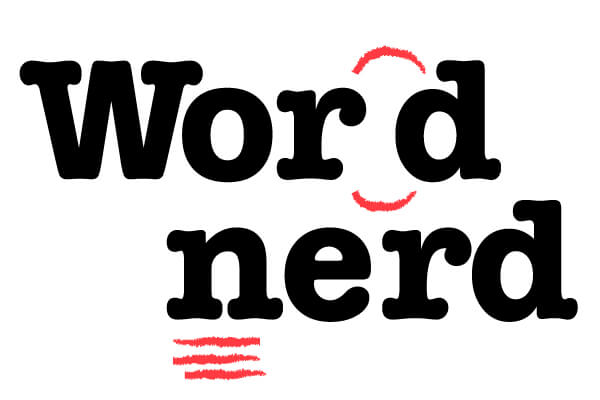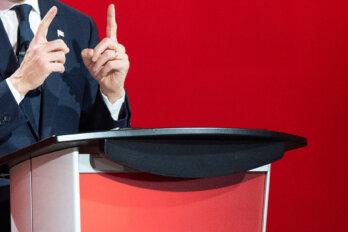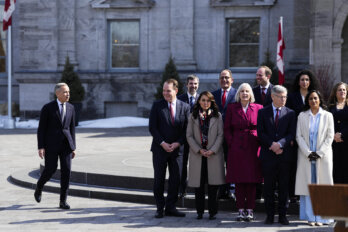I am not in a position to vote in the upcoming American election, but I am nevertheless prepared to take a stand: I am not going to write an article mocking Donald Trump for his language gaffes.
It would certainly be tempting to write a piece called something like “30 Times Donald Trump Yugely Butchered the English Language—Sad!” He has, after all, given us such debate-night delights as “vast swatches of land”; “the cyber”; and, of course, “bigly”—or perhaps it’s “big league,” as both Trump’s camp and various experts consulted by the New York Times claim. He speaks in a style so distinctive that a cottage industry has grown up around making other people (such as our very own Justin Trudeau) sound just like him.
I’m not steering clear of a breezy but excoriating listicle because I don’t think words are important. Words are rarely ever “just words,” especially in the context of a presidential contest. (Or when they’re racist, sexist, derogatory, and inflammatory.) And it’s not as if holding Trump up to ridicule for his rhetorical excesses and excrescences would be mean or unfair: attacking Trump is an exercise in punching up. He has had every opportunity; he has had the best opportunities; you wouldn’t believe his opportunities. They have been big league.
Words matter, and Donald Trump can and should be targeted for criticism. But I have restrained myself for two main reasons: treating his verbal errors and flourishes as buffoonish distracts from the fact that his oratorical approach can be effective, and snickering at his bloopers reinforces the sense that those who oppose him are a bunch of out-of-touch, elitist nitpickers.
It may seem ludicrous to describe Trump’s speaking habits as “effective”—he often comes across as terrifically, tremendously incoherent. His rhetorical strategies, though, are based on sound principles. George Lakoff, a linguistics professor at Berkeley, explains that Trump employs “effective discourse mechanisms to communicate what he wants to communicate to his audience,” adding, “I have found that he is very careful and very strategic in his use of language.” He then goes on to analyze a few of Trump’s more incendiary statements—including his reference to the “Second Amendment people” and what they may or may not be willing to do if Hillary Clinton is elected—pointing out the surprising degree of nuance that informs them. Lisa Mascaro of the LA Times also breaks down some of his of go-to techniques, explaining the effectiveness of name-calling, simple diction, phrases such as “believe me” and “people say,” hyperbole, and repetition. The Washington Post’s Barton Swaim has written about Trump’s tendency to end his sentences with solid, powerful words, even if doing so means that the beginnings of those sentences end up mangled in the process. The fact that he may not have any idea that he has rhetorical strategies does not mean they’re any less successful. When we dwell on the ridiculousness of his words, we are more likely to miss the fact that they may be resonating.
Besides, making hilarious jokes about Trump’s HUUUGE linguistic infelicities simply succeeds in advancing a number of his central narratives: I’m no politician! I’m no Beltway insider! I’m a straight-talking no-nonsense super-rich son of a gun who loves guns not like that Crooked Hillary! In a video entitled “A Linguistic Analysis of Donald Trump Shows Why People Like Him So Much,” someone known as “The Nerdwriter” (with whom I am in no way affiliated) notes, “If you are an American citizen who, for years, has listened to politicians sound sophisticated while accomplishing nothing, you might just be primed for something that is everything they are not.” To his supporters, the fact that Trump bloviates and blusters and blunders is just another thing that distinguishes him from Clinton, who is clearly a Frankenstein’s monster cobbled together from focus-group responses, corporate best practices, and random sections of the New York Times. Sure, she can speak clearly and well, but that’s because she’s both (a) slick and deceptive, and (b) delivering lines that were composed by committee. So every time we tweet out a 140-character takedown of Trump’s latest verbal faux pas (#TrumpGrammar), we add another chapter to the story he himself is writing—about a guy who is so un-Washington, so unafraid of elites or rules or anything, that damn straight he’ll say things that get stuffy headmistresses all worked up.
I’ve written elsewhere about the problems I have with grammar trolls who seek to discredit other writers by highlighting their linguistic missteps, who establish their own authority by trying to link the right to speak with the ability to speak “properly.” Donald Trump is in absolutely no danger of being silenced—but while Trump has a voice so privileged it may as well be gilt-edged, many of his supporters do not. When anti-Trumpers chortle delightedly over the image of a Trump supporter holding a sign with a photo of Paul Ryan and the word “trader” on it, they are not punching up: they are confirming the claim that liberal elites care more about correctness (both political and linguistic) than they do about people.
Treating Trump like an English-mangling clown does nothing to compromise his message—if anything, such an attitude amplifies it. Instead of ridiculing him for the form of his statements, we should be setting our sights firmly on their content: God knows, there’s enough material there to keep us busy for at least four years.




